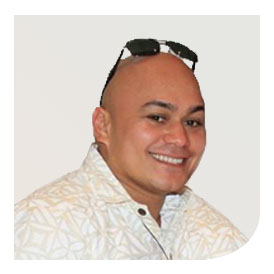 Richard Nathan Crichton
Richard Nathan Crichton
Degree: Postgraduate Diploma in Climate Change
Graduated: December 2015
Current Employment:
I am currently unemployed, but a full-time student at University of Tokyo (Todai) to further pursue degrees towards a PhD in Sustainability Science. My most recent former place of employment was the Food and Agriculture Organization of the United Nations (FAO)
What was your reason for enrolling in a Climate Change degree in PaCE-SD?
I had a desire to obtain a formal degree in environment and climate change as I was working for United Nations agencies/donors. This program provided that platform, and gave me confidence to further contribute in climate change, food security and poverty reduction through an internationally recognized degree.
What does your current career involve? (i.e your main responsibilities)
Currently as a research student at the University of Tokyo, I am conducting research in the areas of coral reefs, coastal fisheries management and disaster management that will help address the challenges Pacific islands are facing.
How has your knowledge and skills gained from your studies assisted you and the organisation that you are working in with their duties related to climate change?
My studies at the University of the South Pacific really opened doors for me and allowed me to secure a full scholarship from the Government of Japan (Monbukagakusho (MEXT) Scholarship) to further research work at the University of Tokyo. This opportunity would not have been possible without the diploma I received from USP. For that I am truly grateful for my acceptance into the postgraduate climate change program.
Can you tell us about any success stories in your career after you have graduated that you believe was made possible with your study experience at PaCE-SD?
Following my graduation, I received a few job offers from organizations working in the area of sustainable development. This was a clear indication of the value of the program but also particularly the need for individuals specializing in climate change and sustainable development.
My acceptance into one of the world’s prestigious universities, to undergo further studies in sustainability is a great success.
What have you done differently/better now in your job after graduation?
Following my graduation, I started working for FAO in the program management division, and I applied the knowledge I learned from the courses at USP on Agriculture, Fisheries and Forestry activities and projects, specifically in areas of environmental impact, resilience, disaster risk reduction/management.
What ambitions do you have for the future in your career?
I would like to do proper research and further raise awareness of the Pacific island countries in advocating for global emissions to be reduced or halted; assist the adaptation of small island states, especially atoll island states; protect the sovereignty of the small island states; protect coastal resources and areas from impacts of natural disasters; and protect coastal resources from the negative effects of climate change.
What are you most proud of in your life? (Can be a personal achievement or work related).
My family, and their never-ending support in my educational pursuits. Also, my religious upbringing has not only influenced the way I am today, but provides guidance for service.
What inspires you to pursue the type of work that you are in?
As a child, I was fascinated by the environment and its rich biological diversity. At one stage my mother worked for an environmental NGO, which gave me some exposure to environmental issues. My passion for the environment came stronger when I did voluntary missionary work for the Church of Jesus Christ of Latter-day Saints serving in Tacloban, Philippines (region 8) for two years. I witnessed first-hand the inequality–in wealth and resource distribution–which accounted for much of the extreme poverty and extreme wealth in that region. I returned home, determined to make a difference in the lives of people in these poorer conditions, by supporting sustainability through environmental and natural resource management.
Who is your role model and why?
Nelson Mandela: an inspiration for fighting for what you truly believe in. He was not only imprisoned for 27 years, for fighting for what was right. He showed no animosity towards those who wronged him. His achievement in politics and unifying a divided country is a great legacy.